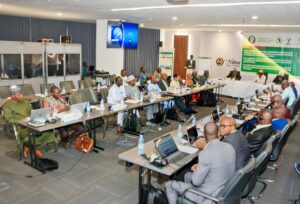ECOWAS Joint Forces Against Antimicrobial Resistance in West Africa and the Sahel. By Raymond Enoch
In a unified effort to confront one of the world’s most pressing health threats, veterinary experts and policymakers from across West Africa and the Sahel converged in Dakar for the Sixth Meeting of the ECOWAS Regional Veterinary Committee (RVC), placing antimicrobial resistance (AMR) firmly in the spotlight.
Described by the World Health Organization (WHO) as one of the top ten global health threats, AMR – often dubbed the “silent pandemic” – is fast becoming a regional crisis. Caused by the misuse and overuse of antimicrobial drugs in humans and animals, AMR has led to the rise of “superbugs” that defy conventional treatments, endangering both public and animal health and straining economies.
“Antimicrobial resistance is not just a medical challenge. It’s an economic, agricultural, and social emergency,” emphasized experts at the meeting which took place from April 10–12, 2025. Alarming statistics, such as the rise in antibiotic resistance in Côte d’Ivoire from 9% in 2002 to 46% in 2018, and findings in Senegal where E. coli strains resisted more than ten antibiotics, underscored the urgency of action.
Hosted with support from the ECOWAS Regional Animal Health Centre (RAHC), the meeting brought together chief veterinary officers, national veterinary boards, and international partners like the World Organisation for Animal Health (WOAH/OIE), UEMOA, and FAO. The sessions focused on strengthening regional collaboration under the ‘One Health’ framework — a holistic approach recognizing the interdependence of human, animal, and environmental health.
Participants acknowledged that while many countries possess legal frameworks for veterinary drug use, implementation gaps remain. The committee reached consensus on a five-pronged action plan:
Advocate at the political level for AMR-focused policies
Launch awareness campaigns targeting stakeholders
Develop and implement a regional strategic AMR plan
Build capacity in veterinary services and laboratories
Mobilize sustainable financial resources
The committee also emphasized the critical role of vaccines and infection prevention in reducing antibiotic reliance, highlighting the importance of cross-border cooperation.
As AMR continues to jeopardize livelihoods, food security, and healthcare outcomes, ECOWAS’s renewed commitment signals a proactive step toward regional resilience and coordinated response. Stakeholders left Dakar with a clear message: the time to act against AMR is now — together.








